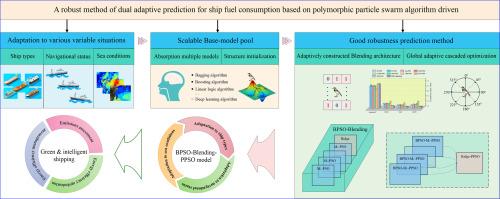基于多态粒子群算法驱动的船舶油耗双自适应性稳健预测方法
IF 10.1
1区 工程技术
Q1 ENERGY & FUELS
引用次数: 0
摘要
油耗预测在船舶排放评估和能效优化方面发挥着不可替代的作用。然而,在不同船型、不同航线和不同运行条件的实际情况下,基于单一算法的油耗预测模型无法有效运行。此外,缺乏构建和优化机制的传统融合模型也缺乏适应性。针对这一问题,本文提出了一种双重自适应预测方法。首先,利用粒子群优化(PSO)算法对每个基础模型进行初始化。接着,采用二元粒子群优化(BPSO)算法构建自适应混合架构。最后,使用相位粒子群优化(PPSO)算法对融合模型进行自适应级联优化。根据上述方法,构建了 BPSO-Blending-PPSO 模型,并利用两艘舰艇的运行数据进行了验证,该模型始终保持最佳性能。结果表明,与单一算法模型相比,BPSO-Blending-PPSO 模型的 RMSE 值降低了 5.2886-46.7492 %,有效地适应了不同船舶的各种航行条件。该方法不仅为提高船舶油耗模型的预测精度和鲁棒性提供了新的视角,而且通过将各种新型预测算法纳入基础模型池,表现出良好的可扩展性。本文章由计算机程序翻译,如有差异,请以英文原文为准。

A robust method of dual adaptive prediction for ship fuel consumption based on polymorphic particle swarm algorithm driven
Fuel consumption prediction plays an irreplaceable role in the assessment of ship emissions and energy efficiency optimization. However, in practical and diverse situations with different ship types, routes, and operating conditions, single-algorithm-based fuel consumption prediction models fail to operate effectively. Additionally, conventional fusion models that lack construction and optimization mechanisms also lack adaptability. To tackle this issue, this paper proposes a dual-adaptive prediction method. Initially, the Particle Swarm Optimization (PSO) algorithm is utilized to initialize each base-model. Next, the Binary Particle Swarm Optimization (BPSO) algorithm is employed to construct an adaptive Blending architecture. Finally, the Phasor Particle Swarm Optimization (PPSO) algorithm is used for adaptive cascaded optimization of the fusion model. Based on the aforementioned approach, the BPSO-Blending-PPSO model, which consistently maintains optimal performance, is constructed and validated using operational data from two ships. The results demonstrate that the BPSO-Blending-PPSO model reduces the RMSE value by 5.2886–46.7492 % compared to single-algorithm models, effectively adapting to various sailing conditions of different ships. This method not only provides a new perspective to improve the predictive accuracy and robustness of ship fuel consumption models but also exhibits good scalability by incorporating various novel prediction algorithms into the base-model pool.
求助全文
通过发布文献求助,成功后即可免费获取论文全文。
去求助
来源期刊

Applied Energy
工程技术-工程:化工
CiteScore
21.20
自引率
10.70%
发文量
1830
审稿时长
41 days
期刊介绍:
Applied Energy serves as a platform for sharing innovations, research, development, and demonstrations in energy conversion, conservation, and sustainable energy systems. The journal covers topics such as optimal energy resource use, environmental pollutant mitigation, and energy process analysis. It welcomes original papers, review articles, technical notes, and letters to the editor. Authors are encouraged to submit manuscripts that bridge the gap between research, development, and implementation. The journal addresses a wide spectrum of topics, including fossil and renewable energy technologies, energy economics, and environmental impacts. Applied Energy also explores modeling and forecasting, conservation strategies, and the social and economic implications of energy policies, including climate change mitigation. It is complemented by the open-access journal Advances in Applied Energy.
 求助内容:
求助内容: 应助结果提醒方式:
应助结果提醒方式:


